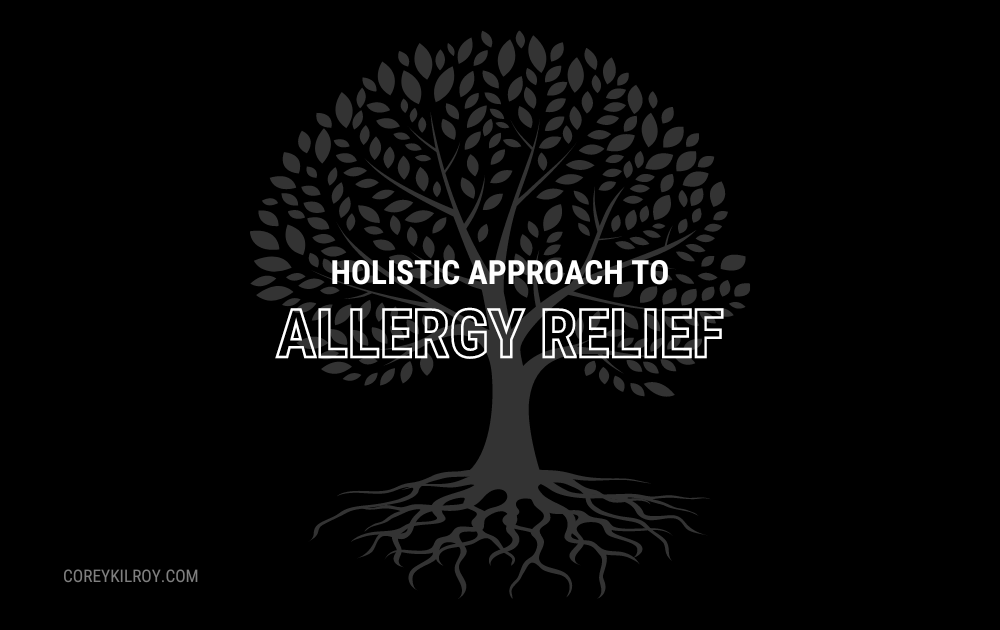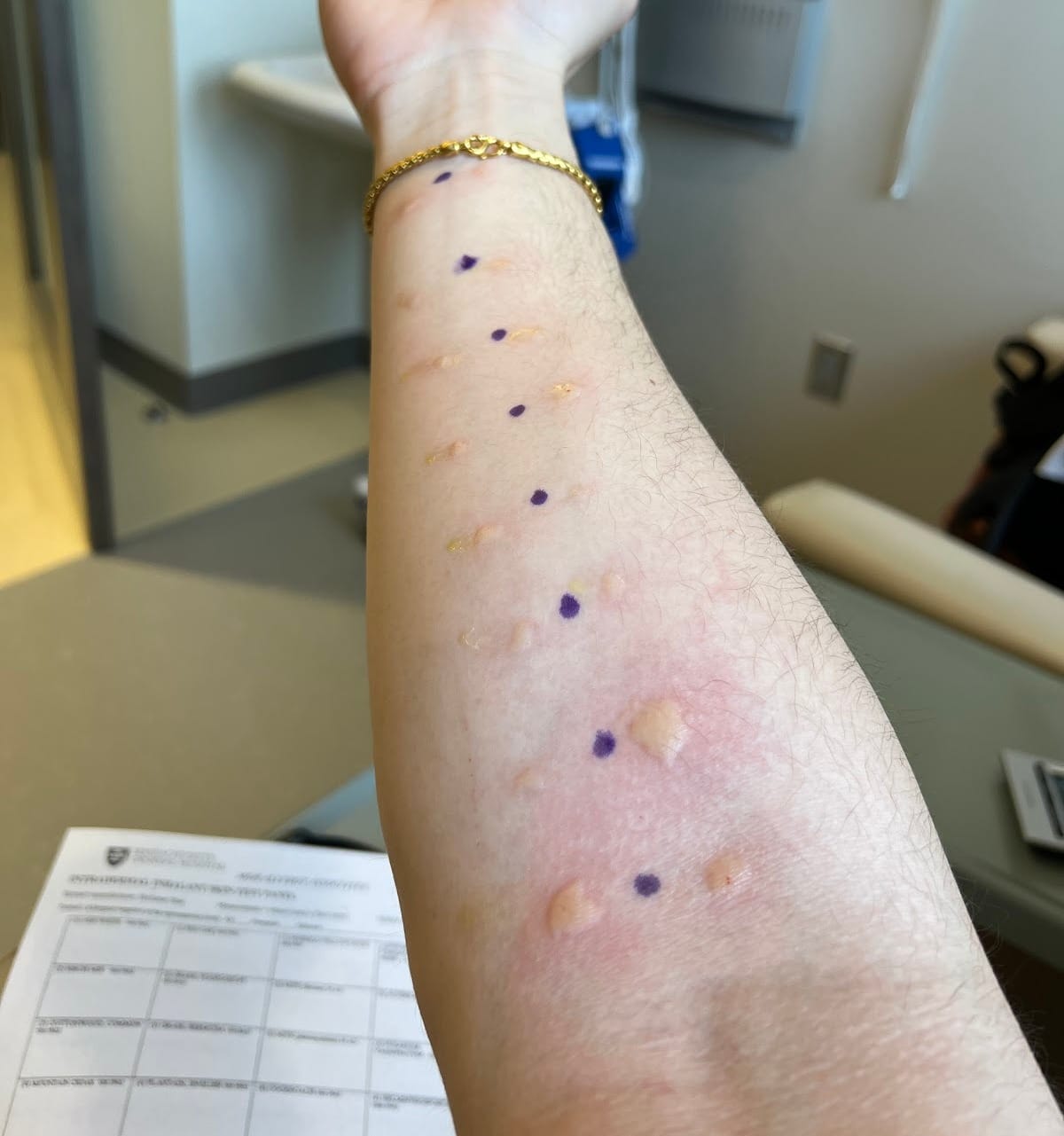Holistic Approach to Allergies.

Spring is arguably the best time of the year.
The weather is getting warmer, the sun is setting later, and outdoor activities are just around the corner.
People are all-around much happier as this time of year approaches.
However, despite all of this – and if you’re anything like me – you may have a slight resentment towards the Spring season.
I’m a chronic allergy-medicine-consumer. Zyrtec or Allegra, 24/7/365.
I recently had the pleasure of undergoing an allergy skin test at the doctor's office for this issue, since I knew it wasn’t natural to require this medication year-round.
Turns out, I’m allergic to every single environmental allergy known to man (besides cats & dogs, luckily, and mold).
Everything highlighted in green indicates the allergen I'm allergic to...
And here's a picture of my arm blowing up during the skin test. Sweet.

Yup, every single one of those bumps indicates an allergic reaction to an environmental allergy.
Birch pollen, ragweed, dust mites, grass pollen, red oak… you name it, I’m allergic to it.
Let’s Dive A Little Deeper
What causes seasonal allergies?
When you come in contact with a substance that you’re allergic to, called an allergen, your immune system treats it as an “intruder”.
As a natural response, your immune system releases chemicals such as histamines, leukotrienes, and prostaglandins.
This is why allergy meds are called “antihistamines” because they combat the histamines your immune system releases in response to the allergen.
The severity of your reaction depends on how much of a threat your body thinks an allergen is.
Take pollen, for example. Most people tend not to have an immune response to pollen, but a certain percentage of people’s immune systems (*cough* me) see it as a foreign and dangerous substance, so they treat it like a pathogen or infection.
When people who are allergic to the allergen breathe it in – like that pollen for example – it ultimately gets trapped in their nasal passages.
Those particles stick to mucus membranes, causing inflammation and irritation to the nose and eyes.
And to make matters worse, many fruits and vegetables stem from the pollen I’m allergic to.
So fruits like apples or peaches cause my mouth and throat to get itchy and irritated.
This is also known as Pollen Food Allergy Syndrome (PFAS), or oral allergy syndrome.
This is caused by the cross-reacting allergens found in both pollen and raw fruits, vegetables, or some tree nuts.
The immune system recognizes the pollen and similar proteins in the food and directs an allergic response to it.
Here’s the handout I was given:
What are common seasonal allergy symptoms?
- Eyes — Itching, redness, tearing, and swelling
- Ears — Pressure, popping, and itching
- Nose — Itching, sneezing, nasal congestion, and runny nose
- Throat — Itching, postnasal drip, and cough
- Sinus — Facial pressure or pain
- Lung — Coughing, wheezing, and shortness of breath
- Skin — Itching or rashes
What are the most common seasonal allergens and when do they occur?
- Tree pollen—March/April
- Grass pollen—June/July
- Ragweed—Fall
- Mold—Fall
Not all environmental allergies are seasonal, however.
“Perennial allergies” can affect you all year long. They include allergies to cat/dog hair and dust mites.
Those darn dust mites get me all year round...
Holistic Remedies for Allergies
1. Natural Antihistamines
a. Vitamin C: A 2023 review of studies showed that vitamin C can have anti-allergy effects. This is because of the anti-inflammatory and antioxidant effects of vitamin C.
b. Quercetin: I personally take this on a regular basis to combat my allergies. Quercetin is an antioxidant flavonoid in many plants and foods we eat (like apples, berries, black tea, broccoli, etc.). Research from 2020 reports that quercetin can have anti-allergic and antihistamine properties.
2. Honey
“Nature’s allergy fighter”. Honey, especially local raw honey, is a natural remedy for allergies. The theory behind this is that local honey, which is made by bees that collect nectar from local plants, can help desensitize the body to pollen. This is particularly beneficial for those suffering from seasonal allergies, as exposure to pollen is one of the most common allergy triggers.
3. Neti Pot: Natural Nasal Rinse
A neti pot is a device used for nasal irrigation, which involves flushing the nasal passages with a saline solution. This can help by physically removing allergens from the sinuses and reducing nasal congestion.
4. Steam inhalation with essential oils
Inhaling steam can help clear nasal passages and relieve sinus congestion by decreasing the inflammation in your sinuses. It can be as simple as boiling a pot of water on the stove and leaning over the pot. You may also try adding essential oils such as eucalyptus or peppermint to the steam to further enhance its therapeutic effects. Eucalyptus oil is known for its powerful anti-inflammatory and decongestant properties.
5. Supplementation
a. N-acetyl cysteine (NAC): I also take this supplement whenever I’m feeling ill or having any respiratory issues. NAC is a supplement form of cysteine. Like cysteine, NAC bonds with glutamine and glycine to form glutathione, a powerful antioxidant. Glutathione performs many functions throughout your body, such as helping to maintain your immune system, and is also found to detoxify the liver and improve respiratory issues, and immune health. By modulating the immune response and reducing histamine release, studies have shown that NAC can help alleviate the immediate discomfort associated with allergies.
b. Bromelain: Bromelain is a mixture of enzymes found in the stem and fruit of the pineapple plant (Ananas comosus). It has a long history of traditional use in folk medicine for its anti-inflammatory properties. Bromelain is known to reduce nasal swelling and thin mucus, thus easing breathing. You'll most likely find this in a supplement paired with Quercetin.
c. Butterbur: No, not the drink from Harry Potter… Butterbur is a plant extract that’s been shown to have some effectiveness comparable to antihistamines in blocking allergic reactions, however, there are currently no long-term studies showing the effectiveness, just yet.
In the end…
Allergies are never fun.
Especially if you’re someone who deals with them year-round (I feel your pain).
These are some natural remedies for combating environmental allergies, however, if you find yourself suffering too much, then there’s nothing wrong with your over-the-counter Zyrtec or Allegra.
Be well and Keep Pluggin.
Until Next Time, C.



